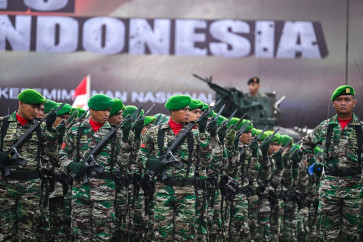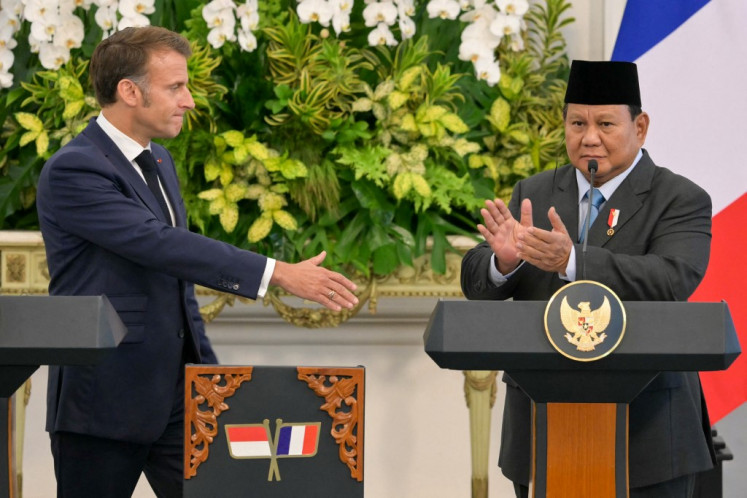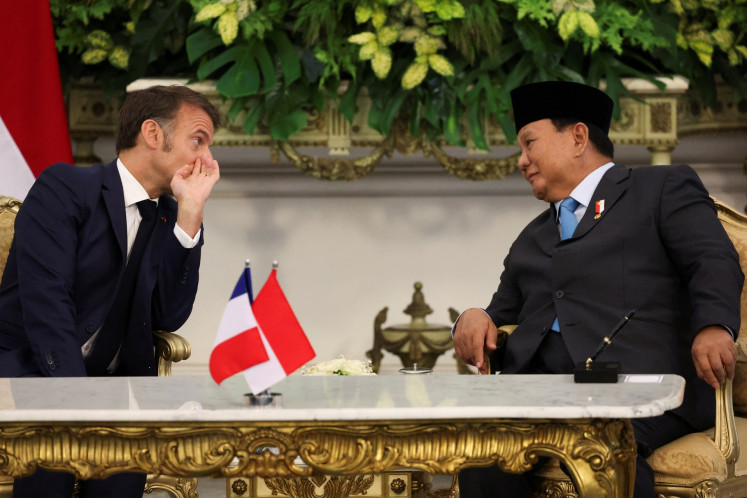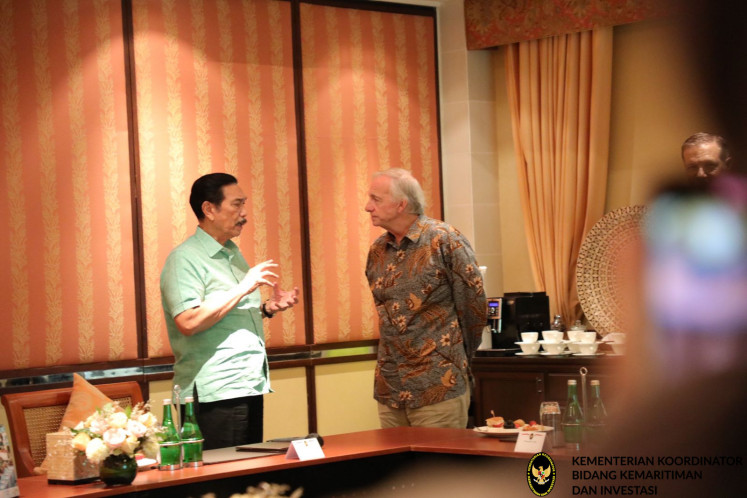Teater Koma performs Nikolai Gogol's classic
Art of criticism: Teater Koma artists perform the opera titled Inspektur Jendral (Inspector General) at the Gedung Kesenian Jakarta on Thursday
Change text size
Gift Premium Articles
to Anyone
 Art of criticism: Teater Koma artists perform the opera titled Inspektur Jendral (Inspector General) at the Gedung Kesenian Jakarta on Thursday. The show will run until Nov. 15.(JP/Seto Wardhana) (Inspector General) at the Gedung Kesenian Jakarta on Thursday. The show will run until Nov. 15.(JP/Seto Wardhana)
Art of criticism: Teater Koma artists perform the opera titled Inspektur Jendral (Inspector General) at the Gedung Kesenian Jakarta on Thursday. The show will run until Nov. 15.(JP/Seto Wardhana) (Inspector General) at the Gedung Kesenian Jakarta on Thursday. The show will run until Nov. 15.(JP/Seto Wardhana)
A
span class="caption">Art of criticism: Teater Koma artists perform the opera titled Inspektur Jendral (Inspector General) at the Gedung Kesenian Jakarta on Thursday. The show will run until Nov. 15.(JP/Seto Wardhana)
Renowned theater troupe Teater Koma is back on stage with Inspektur Jenderal (Inspector General), an adaptation of Nikolai Gogol's satirical play Revizor.
The play, which marks Teater Koma's 142nd theatrical production, is scheduled to run at Gedung Kesenian Jakarta (GKJ) playhouse in Central Jakarta from Nov. 6 to 15.
The play is the latest production from Teater Koma, one of the most productive troupes in the country. In April, it performed the White Snake Opera and Sampek Engtay in August.
Teater Koma director Nano Riantiarno said although Inspektur Jenderal was based on a work dating back to 1836, the troupe believed it needed to be performed in front of the Indonesian public for its relevance in modern times.
The play, he said, centered on corruption and hypocrisy.
The play tells the story of two states ' Astina and Amarta ' that are on the brink of war.
As part of war preparations, the central government of Astina sends an inspector general from the capital city, called Astinapura, to investigate a small town led by Mayor Ananta Bura.
All authorities in the small town learn of the inspector general's arrival but are not aware of what he looks like or what he intends to investigate.
They are all worried about the arrival of the inspector general and his investigation because all public officials in the small town are corrupt.
As the officials grow increasingly anxious, a young man by the name of Anta Hinimba arrives in town.
The small town's officials begin to suspect that Anta is the inspector general and start to bribe him with facilities and money in the hope that he keeps mum about the rampant corruption in the small town when he returns to the capital.
Is Anta the real inspector general? And if he is, can he be bribed by the corrupt officials? These are the central questions of the play.
Inspektur Jenderal features Teater Koma veteran actors and actresses Budi Ros, Ratna Riantiarno, Sari Madjid, Dorias Pribadi, Emmanuel Handoyo, Supartono JW, Asmin Timbil, Daisy Lantang, Ratna Ully, Angga Yasti, Tuti Hartati, Rita Matu Mona, Bayu Darmawan Saleh, Sir Ilham Jambak, Yulius Buyung, Julung Ramadan, Dana Hassan and Rangga Riantiarno.
As seen in Teater Koma's previous adaptations and productions, the actors and actresses perform Inspektur Jenderal under the group's trademark wayang orang traditional Javanese theater style in terms of gestures, songs, dances and visual presentations.
'The story in our adaptation will mostly stick to the original source,' Nano said.
'Hopefully, the audience can grasp the moral message we are trying to convey through the play.'
Composer Fero Aldiansya Stefanus is in charge of scoring Inspektur Jenderal while lighting expert Taufan S. shows his skills in blending European and Indonesian cultures through layers of artistic light manipulations.
The costumes are designed by Rima Ananda Omar, who incorporates classic European style apparel with traditional Javanese wayang orang accessories.
Rima's black and white costumes represent the anticorruption message the play aims to convey.
'The corrupt officials in the play wear both black and white costumes. This is to show that black does not always mean evil and white does not always mean that someone is clean,' Nano said.
'On the other hand, the anticorruption spirit is represented by the funny yet satirical female clown servants, who wear colorful costumes. I want to really make a distinction between the corrupt ones and those who aren't in this play.'









